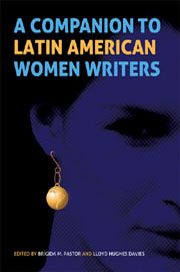Book contents
- Frontmatter
- Contents
- Introduction: The Feminine Voice in Latin American Literature
- 1 Sor Juana Inés de la Cruz (1648/51?–1695)
- 2 Gertrudis Gómez de Avellaneda (1814–1873)
- 3 Gabriela Mistral (1889–1957)
- 4 Alfonsina Storni (1892–1938)
- 5 Silvina Ocampo (1903–1993)
- 6 Clarice Lispector (1920–1977)
- 7 Rosario Castellanos (1925–1974)
- 8 Elena Poniatowska (1933– )
- 9 Alejandra Pizarnik (1936–1972)
- 10 Luisa Valenzuela (1938– )
- 11 Isabel Allende (1942– )
- 12 Rosario Ferré (1938– )
- 13 Laura Esquivel (1950– )
- 14 Laura Restrepo (1950– )
- Conclusion
- Bibliography
- Index
Conclusion
Published online by Cambridge University Press: 05 February 2013
- Frontmatter
- Contents
- Introduction: The Feminine Voice in Latin American Literature
- 1 Sor Juana Inés de la Cruz (1648/51?–1695)
- 2 Gertrudis Gómez de Avellaneda (1814–1873)
- 3 Gabriela Mistral (1889–1957)
- 4 Alfonsina Storni (1892–1938)
- 5 Silvina Ocampo (1903–1993)
- 6 Clarice Lispector (1920–1977)
- 7 Rosario Castellanos (1925–1974)
- 8 Elena Poniatowska (1933– )
- 9 Alejandra Pizarnik (1936–1972)
- 10 Luisa Valenzuela (1938– )
- 11 Isabel Allende (1942– )
- 12 Rosario Ferré (1938– )
- 13 Laura Esquivel (1950– )
- 14 Laura Restrepo (1950– )
- Conclusion
- Bibliography
- Index
Summary
Writing by women is often seen as a form of resistance, even as a revolutionary act, as Debra A. Castillo points out (1992: 20). Even so, it is not always taken seriously (Marting, 2003: 200), often regarded, sometimes by women themselves, as limited: Castillo (1992: xix) points to the Mexican critic Sara Sefchovich, who – ironically – herself claims to be a militant feminist (Franco, 1996: 227). Nonetheless, the best Latin American writing is ‘antihegemonic and challenges a monumentalizing or totalizing view of literature’ (Castillo, 1992: xxii). Many women writers are constructing ‘una voz propia’ (1992: 100) [a voice of their own]: Castellanos espouses an ‘adjectival writing’ and advocates the celebration not of depth (the unquestioned virtue of traditional male writing) but of the superficial. Valenzuela subtly employs masculinist assumptions against themselves (1992: 101). The concept of the ‘post-lettered city’ ‘stretches Rama's work on urban, elite cultural space’ to offer a place ‘where women's writing, not only their resistance, their orality, or their sexuality, can play a role” (Schwartz, 2007: 14).
In their common focus on gender these women writers engage with what is arguably the paramount cultural issue in contemporary Latin America. Their deconstructive work assumes particular urgency in the case of Argentina where the patriarchal authoritarian regime conceived of its mission in overtly gendered terms. Kantaris claims that ‘awareness of gender as a horizon which can no longer afford to be ignored marks what we might call an epistemological shift in both the practice and the theory of culture in Latin America’ (1995: 3).
- Type
- Chapter
- Information
- A Companion to Latin American Women Writers , pp. 213 - 216Publisher: Boydell & BrewerPrint publication year: 2012

